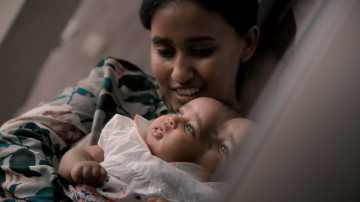Translational Network and Research

The Zero to Thrive initiative brings together faculty across multiple disciplines to find real-world solutions to the problems families face from pre-conception through early childhood (0-6). Zero to Thrive brings together providers, academics, policy makers, and, importantly, families, to establish a shared agenda and common metrics.
This type of innovative, multi-layered research, is only possible with active collaborations with communities and multidisciplinary faculty, drawing on the strengths of a leading university with state-of-the-art knowledge and expertise. It is within this work with communities and across disciplines that dynamic and real solutions to lingering social problems can be found.

It is our goal to work with communities across public-private spheres to significantly impact the health and well-being of families with young children (0 – 6) right from the very start.
Z2T Translational Network and Research Leadership

Maria Muzik,
MD, MSc
Co-Director, Zero to Thrive
AREAS OF INTEREST
- Perinatal Psychiatry: Depression and Anxiety during pregnancy and postpartum
- Prevention and Therapy of Mother-Infant relationship and attachment disturbances
- Impact of maternal/family psychiatric illness on early child development
- Trauma, Stress & Posttraumatic Stress Disorder (PTSD) during childbearing years
- Neurobiology of Stress, Depression and PTSD
- Parent-Infant Relationships in Postpartum Depression and Anxiety Disorders; Infant Attachment Disorders
- Precursors of early infant stress and emotion regulation

Katherine Rosenblum,
PhD, ABPP
Co-Director, Zero to Thrive
AREAS OF INTEREST
- Infant and early childhood mental health
- Dyadic and relationship-focused psychotherapy
- Trauma and loss in infancy and early childhood, including a focus on child welfare
- Special populations including military families with young children
- Parent mental health and intergenerational transmission of risk
- Parenting interventions in early childhoodInfant and early childhood mental health
- Parental representations and meaning-making systems

Alison Miller,
PhD
Steering Committee Chair, Translational Network,
Zero to Thrive
AREAS OF INTEREST
- Risk and resilience in children and families
- Infant and early childhood mental health
- Child bio-behavioral regulation, family functioning, and social context
- Basic developmental processes, including self-regulation of emotions, sleep, eating behavior, and neuroendocrine stress responses in young children
- Children and families who are at risk for unhealthy outcomes for various reasons, including living with maternal incarceration; in poverty conditions; or in high-violence neighborhoods
TRANSLATIONAL NETWORK FEATURE

Kara Zivin, PhD
Professor, Health Management and Policy, School of Public Health
Faculty Associate, Survey Research Center, Institute for Social Research
Research Scientist, Center for Clinical Management Research, VA Ann Arbor Healthcare System
Dr. Zivin’s scholarly niche is at the intersection of behavioral health, public health, and public policy. She conducts mixed methods research and large policy evaluations. Recently, Dr. Zivin shared about her own experience in a MedPage Today podcast/essay: I Was Pregnant and Swallowed Handfuls of Pills – And now I want to end the stigma around depression.
Read more about Dr. Zivin’s recent work:
- JAMA Psychiatry: Trends in Suicidality 1 Year Before and After Birth Among Commercially Insured Childbearing Individuals in the United States, 2006-2017
- UM Institute for Healthcare Policy & Innovation: Expert Q&A: Measuring and informing policy to address gaps in maternal mental health care
- UM Health Lab: Suicide Risk During Pregnancy, After Childbirth on the Rise
- MedPage Today: Pregnancy-Related Suicidality on the Rise, Often Going Undetected
- The 19th News: New research finds dramatic growth in suicidal thoughts and self-harm during and after pregnancy
- Huffington Post: Suicide ‘Near Misses’ Are On The Rise Among New Moms, Data Shows
- Psychiatric Times: Study Finds Alarming Increase in Suicidality During Pregnancy
- USA Today: New research finds growth in suicidal thoughts and self-harm during and after pregnancy
Translational Network: What's Happening

Translational Network Spring 2021 Meeting
On May 5th, the Zero to Thrive Translational Network sponsored a Rapid Response Talk and
panel discussion, “Building Bridges, Breaking Barriers: Community Engagement in Research and Why It Matters”. This Rapid Response Talk convened panel of community and advocacy leaders and featured community-based efforts to address race/ethnicity related inequities affecting young children and families in Michigan.

Focus on Health Equity: Mom Power Focus Groups
The goal is to strengthen the positive impact and support that Mom Power programs provide diverse populations of mothers and children it serves by soliciting and incorporating ideologically and socially diverse insight and feedback from key stakeholders (mothers and providers who serve them) on the content and potential social, cultural, as well as mental health impact of the Mom Power program on these same audiences.

Z2T Relevant Courses at UM
For those seeking coursework in this area, a file put together by MPH student, Rachel Varisco, lists Zero to Thrive relevant courses across a broad range of University of Michigan departments:
If you're interested in more information or joining the Z2T Translational Network, please contact the Zero to Thrive team:


